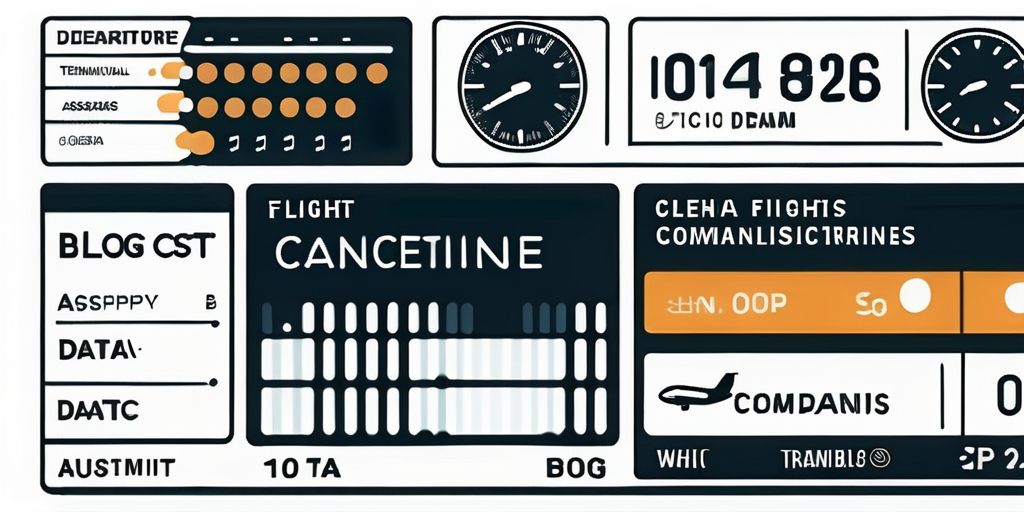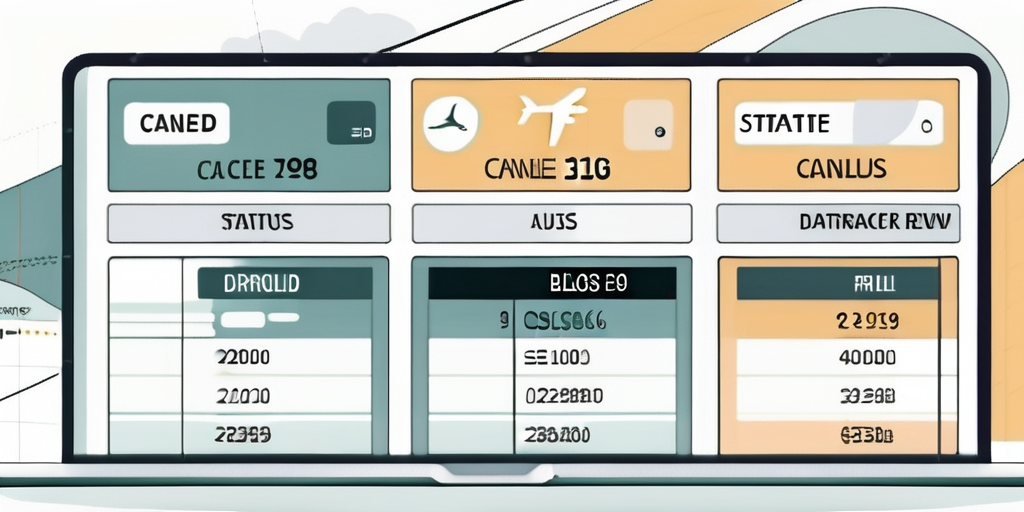Flight Cancellation Tracker: Stay Updated on Flight Disruptions
Keep tabs on flight cancellations with our tracker. Real-time updates to help you plan and adapt to changes effortlessly.
In this era of increased travel, flight cancellations have become a common occurrence. Understanding the causes and impact of flight disruptions can help travelers stay informed and minimize the inconvenience they may experience. Fortunately, there are helpful tools available, such as flight cancellation trackers, that can provide real-time updates and valuable information to keep travelers informed and prepared.
Understanding Flight Cancellations
The Impact of Weather on Flight Schedules
One of the primary causes of flight cancellations is severe weather conditions. From thunderstorms to hurricanes, adverse weather can disrupt flight operations and compromise passenger safety. Airlines prioritize the well-being of their passengers by grounding or canceling flights when faced with inclement weather. While this is done as a precautionary measure, it can often result in unexpected travel disruptions.
When it comes to severe weather, airlines rely on meteorological forecasts and data to make informed decisions about flight cancellations. They closely monitor weather patterns and consult with meteorologists to assess the potential risks to flight operations. By doing so, airlines can proactively cancel flights to avoid putting passengers and crew in harm's way.
How Mechanical Issues Cause Flight Disruptions
Another common reason for flight cancellations is mechanical issues. Airlines have strict maintenance protocols to ensure aircraft safety, and if any technical problems arise, they may be forced to cancel a flight until the issue is resolved. While these cancellations are made with passenger safety in mind, they can cause significant delays and inconveniences for travelers.
When a mechanical issue is detected, airlines have dedicated maintenance teams that assess the problem and determine whether it can be fixed within a reasonable timeframe. If the issue requires more extensive repairs or replacement parts, the airline may have no choice but to cancel the flight. This decision is made to prevent potential in-flight malfunctions that could jeopardize passenger safety.
The Role of Air Traffic Control in Flight Cancellations
Air Traffic Control (ATC) plays a crucial role in managing and regulating air traffic. During times of excessive congestion or technical difficulties, ATC may implement restrictions or reroute flights to ensure safe operations. These changes can lead to flight cancellations or delays, as the aviation system works to maintain order and passenger safety.
ATC constantly monitors the flow of air traffic, taking into account factors such as airspace capacity, weather conditions, and aircraft performance. In cases where there is a high volume of flights or unexpected events, such as a sudden increase in severe weather, ATC may need to make adjustments to the flight routes or hold aircraft on the ground. These measures are taken to prevent overcrowding in the airspace and maintain safe separation between aircraft.
While flight cancellations caused by ATC decisions can be frustrating for passengers, it is important to understand that these actions are taken to ensure the overall safety and efficiency of the aviation system. By managing air traffic effectively, ATC helps reduce the risk of mid-air collisions and ensures that flights can operate smoothly even in challenging circumstances.
The Importance of Staying Updated on Flight Disruptions
Avoiding Travel Hassles with Timely Information
By staying updated on flight disruptions, travelers can make more informed decisions about their travel plans. Timely information allows passengers to adjust their itineraries, rebook flights, or explore alternative transportation options before getting caught up in potential travel chaos. With accurate and real-time updates, passengers can avoid unnecessary hassles and minimize the impact of flight cancellations.

How Real-Time Updates Can Save Time and Money
Real-time updates provided by flight cancellation trackers can be invaluable in saving both time and money. By being aware of flight disruptions ahead of time, travelers can make alternate plans or take advantage of early rebooking options offered by airlines. This proactive approach can help individuals avoid costly last-minute bookings or lengthy layovers.
The Benefits of Being Proactive About Flight Changes
Proactively staying updated on flight disruptions allows travelers to explore various options and find solutions that best suit their needs. Instead of relying solely on airlines to inform them about flight cancellations, passengers can anticipate disruptions and implement contingency plans, such as arranging overnight accommodations or finding alternative airports to fly into. This proactive mindset empowers passengers to take control of their travel experiences.
Moreover, staying updated on flight disruptions can also provide travelers with a sense of peace of mind. Knowing that they are well-informed about any potential changes or delays can alleviate anxiety and stress associated with air travel. It allows passengers to mentally prepare for any possible disruptions and approach their journey with a calm and composed mindset.
Additionally, being aware of flight disruptions can also help travelers manage their time more efficiently. With real-time updates, passengers can plan their arrival at the airport accordingly, avoiding unnecessary waiting times. This can be particularly beneficial for business travelers who have tight schedules and cannot afford to waste precious time in the airport.
How Flight Cancellation Trackers Work
The Technology Behind Flight Tracking
Flight cancellation trackers utilize advanced technology to provide accurate and real-time flight information. These trackers access various data sources, including airline systems, airport databases, and ATC information, to gather flight status updates. Sophisticated algorithms then process this data to generate comprehensive reports that are accessible to travelers via websites or mobile applications.

Understanding Flight Status Codes
Flight status codes are integral to understanding the information provided by flight cancellation trackers. These codes classify flights based on their operational status, whether they are on time, delayed, in-progress, diverted, or canceled. By familiarizing themselves with these codes, travelers can quickly interpret the flight tracker's updates and make informed decisions based on the situation at hand.
How to Interpret Flight Tracker Information
When using a flight cancellation tracker, it's essential to understand how to interpret the information it provides. Trackers typically offer details such as the reason for cancellation, alternate flight options, and contact information for airline customer service. By comprehending this information, passengers can take appropriate action, such as rebooking flights, contacting their airlines, or seeking assistance from travel agents if necessary.
Flight cancellation trackers rely on a vast network of data sources to ensure the accuracy of their information. These sources include not only airline systems and airport databases but also weather reports, air traffic control updates, and even social media platforms. By aggregating data from multiple sources, flight cancellation trackers can provide a comprehensive view of a flight's status, taking into account various factors that may impact its operation.
One of the key challenges in developing flight cancellation trackers is the need for real-time updates. Flight statuses can change rapidly due to factors such as weather conditions, mechanical issues, or air traffic congestion. To address this challenge, flight cancellation trackers employ advanced algorithms that continuously monitor and analyze incoming data. These algorithms can detect patterns and anomalies, allowing them to provide up-to-date information to travelers in a timely manner.
Choosing the Right Flight Cancellation Tracker
Key Features to Look for in a Flight Tracker
Selecting the most suitable flight cancellation tracker depends on individual preferences and requirements. However, there are some key features to consider when choosing such a tool. These include real-time updates, user-friendly interfaces, alert notifications, the ability to search specific flights or airports, and compatibility with different devices and operating systems. Opting for a tracker that meets these criteria can greatly enhance the user experience.

Comparing Different Flight Tracker Apps and Websites
There are numerous flight cancellation tracker apps and websites available, each with its own unique offerings. It is prudent to compare these options to identify the one that best aligns with personal needs. Looking at user reviews, considering the accuracy of information provided, and evaluating the reliability of the platform are essential steps in finding the most suitable flight tracker.
Making the Most of Your Flight Tracker
Once a flight cancellation tracker has been selected, it is crucial to maximize its effectiveness. Regularly updating the app or website to ensure access to the latest features and improvements is important. Additionally, enabling notifications and alerts can help proactively track flights and receive timely updates. Familiarizing oneself with the tracker's functionalities through tutorials or user guides can also prove beneficial in fully utilizing the provided tools and enhancing the travel experience.
Moreover, some advanced flight cancellation trackers offer additional features that can further enhance the user experience. For example, certain trackers provide historical data on flight cancellations, allowing users to analyze trends and make informed decisions about their travel plans. This can be particularly useful for frequent travelers or those who rely heavily on air transportation for business purposes.
Another noteworthy feature to consider is the integration of social media platforms within the flight cancellation tracker. This integration allows users to share their flight status updates with friends and family, providing them with peace of mind and keeping them informed about any changes in travel plans. This feature can be especially valuable during times of uncertainty or emergencies, as it enables seamless communication and coordination.
In a world where travel plans can be disrupted at a moment's notice, having access to a flight cancellation tracker is a game-changer. Staying informed about flight disruptions allows travelers to remain flexible, adapt their plans, and minimize the inconveniences associated with cancellations. By choosing the right tracker, understanding how it works, and actively utilizing its features, passengers can enhance their travel experience and navigate flight disruptions with confidence.
Get the Compensation You Deserve with ClaimCompass
Flight disruptions can be more than just an inconvenience—they can be costly. But with ClaimCompass, you have a powerful ally to ensure you're compensated for flight delays, cancellations, and overbookings. Our expertise in EU Regulation 261/2004 empowers us to fight for your rights and secure up to 600€ that you may be entitled to. Don't let airlines keep what's yours; use our free compensation calculator to check your eligibility and let us handle the rest. Remember, there's no fee unless we succeed. Ready to turn your travel turmoil into triumph? Submit a claim today and let ClaimCompass navigate you to the compensation you deserve.
